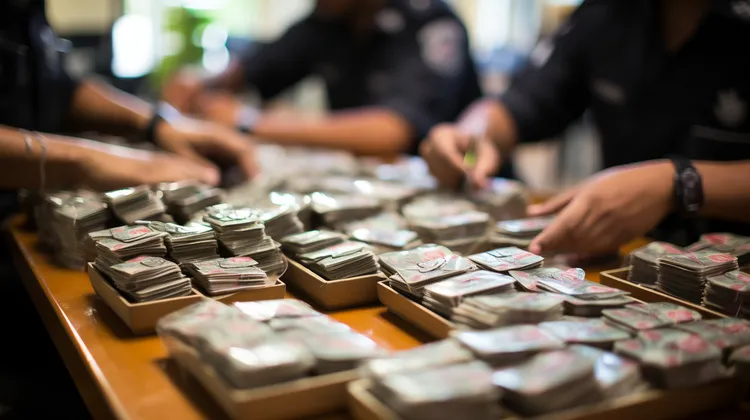Singapore has once again made headlines in the world of cryptocurrency, after seizing a staggering $28 million worth of crypto assets in a major money laundering case. This incident highlights the growing concerns surrounding the misuse of cryptocurrencies for illicit activities, and demonstrates Singapore’s commitment to cracking down on such offenses.
The city-state has long been considered a global hub for cryptocurrencies and blockchain technology, attracting numerous cryptocurrency businesses and investors due to its favorable regulatory environment. This case serves as a wake-up call for authorities and industry players alike, showcasing the need for more robust measures to combat money laundering and other illicit activities.
According to reports, the Singapore Police Force’s Commercial Affairs Department (CAD) successfully seized the crypto assets as part of an ongoing investigation into a major money laundering syndicate. The syndicate allegedly used cryptocurrencies to facilitate their illicit activities, taking advantage of the perceived anonymity and borderless nature of these digital assets.
The authorities have not disclosed specific details of the case, including the exact nature of the offenses, or the types of cryptocurrencies seized. It is believed that Bitcoin and other popular cryptocurrencies were involved in the transactions under investigation. As the investigation progresses, more information is expected to be released, shedding light on the techniques employed by the syndicate and their attempts to launder money.
This high-profile case highlights the importance of robust anti-money laundering measures in the crypto industry. The Monetary Authority of Singapore (MAS), the country’s financial regulator, has been proactive in implementing regulations to detect and deter money laundering and terrorism financing activities in the digital asset space. The MAS requires cryptocurrency businesses to comply with stringent customer due diligence and transaction monitoring requirements, imposing penalties for non-compliance.
Singapore’s efforts to combat money laundering in the crypto sector are in line with global efforts to strengthen the integrity of the financial system. Cryptocurrencies have often been associated with illegal activities due to their privacy-centric features, making them an attractive option for criminals looking to hide their illicit gains. This has prompted regulators around the world to tighten their grip on cryptocurrencies, implementing stricter regulations and enhancing cooperation with international counterparts.
The seizure of $28 million worth of crypto assets is Singapore’s largest crypto asset seizure to date, and it sends a strong message to criminals operating in the space. The authorities are not turning a blind eye to the risks associated with cryptocurrencies and are determined to go after those who exploit these digital assets for illegal purposes.
This case reinforces the importance for individuals and businesses to exercise caution when dealing with cryptocurrencies. While cryptocurrencies present various benefits, including faster and cheaper cross-border transactions, the lack of regulation and traceability brings inherent risks. It is crucial for individuals and businesses to conduct thorough due diligence and ensure compliance with regulatory requirements to protect themselves and the financial system at large.
In response to this incident, the crypto industry in Singapore may experience increased scrutiny from regulators, leading to more stringent compliance measures. Cryptocurrency businesses will need to invest in robust anti-money laundering and know-your-customer procedures to maintain their reputation and stay ahead of the evolving regulatory landscape.
Despite the negative implications associated with this case, it is essential to recognize that Singapore’s response demonstrates its commitment to maintaining a safe and trusted environment for cryptocurrencies and blockchain technology. This incident serves as a reminder that cryptocurrencies should be regulated to protect both investors and the industry’s integrity, without stifling innovation and growth.
The ongoing investigation into this major money laundering syndicate will likely provide valuable insights into the techniques adopted by criminals in exploiting cryptocurrencies. The findings from this case will not only assist Singaporean authorities but also contribute to the global fight against money laundering and the illicit use of cryptocurrencies.
As the world continues to grapple with the challenges posed by cryptocurrencies and their potential misuse, it is crucial for countries to collaborate and share insights to strengthen their regulatory frameworks. Singapore’s seizure of $28 million worth of crypto assets emphasizes the need for ongoing efforts to combat illicit activities in the crypto space and reinforces the importance of establishing resilient and effective regulatory frameworks on a global scale.



